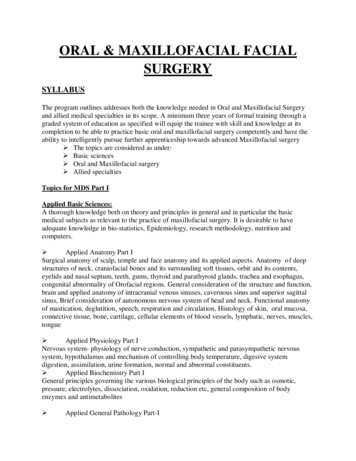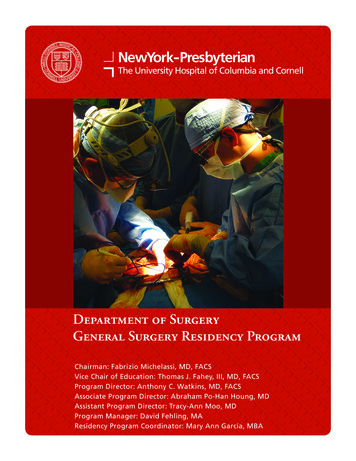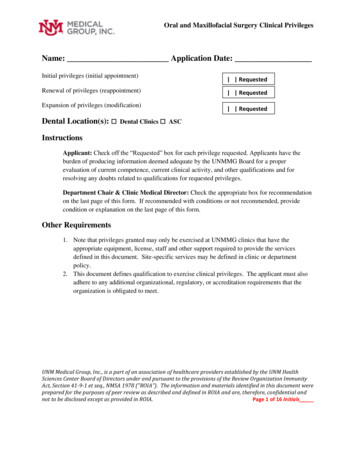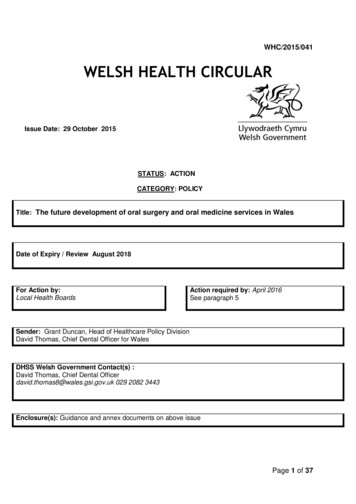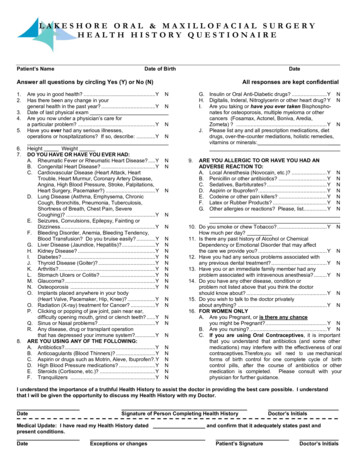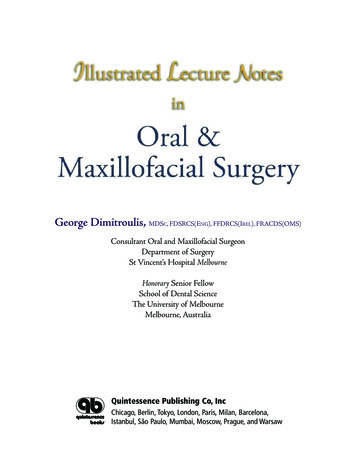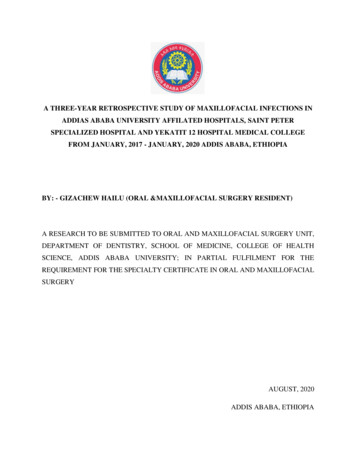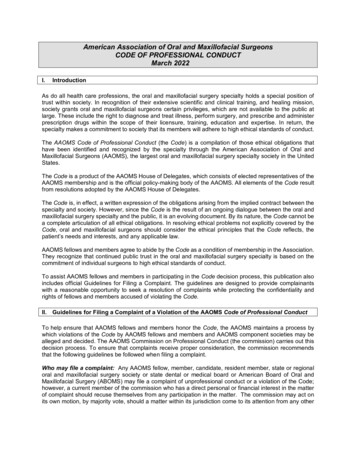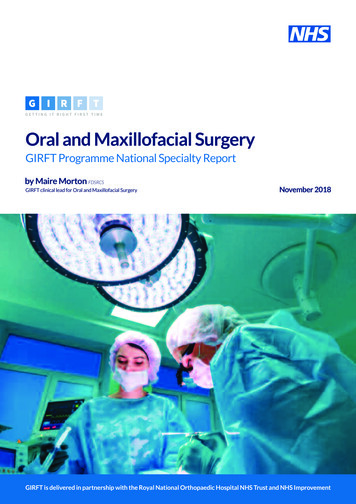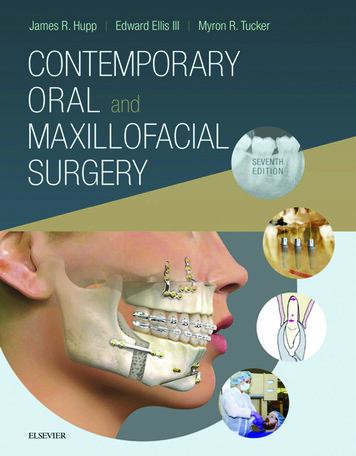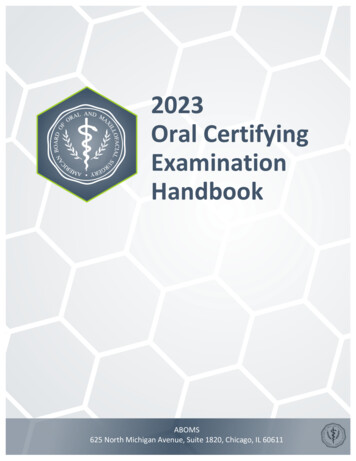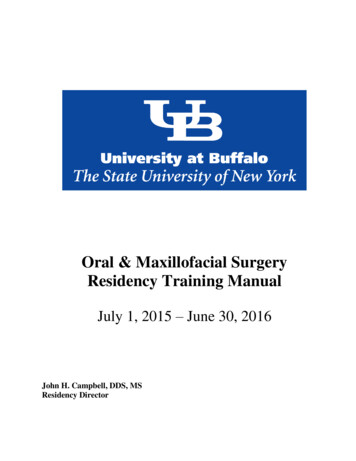
Transcription
Oral & Maxillofacial SurgeryResidency Training ManualJuly 1, 2015 – June 30, 2016John H. Campbell, DDS, MSResidency Director
Table of ContentsIntroductionGoals and ObjectivesGeneral InformationSchool of Dental MedicineErie County Medical CenterKaleida Health ServicesOffice of Graduate Medical EducationSalaryProfessional LiabilityAttire and ConductPatient ConfidentialityMedical RecordsPatient RoundsEducational SeminarsVacation PolicyBloodborne and Infectious Disease PolicyEmployment outside the Residency ProgramFiling a ComplaintDepartmental Structure/Program AdministrationEmergency CallGuidelines for Answering ConsultationsDictationClinical RotationsOn-Service RotationsOff-Service RotationsConferences, Seminars, and Courses33456777777888899101111121213132
INTRODUCTIONResidency training in oral and maxillofacial surgery is a privilege afforded very few dentists.It is our belief that the educational opportunities available at the University at Buffalo will enable eachgraduate of this program to achieve certification by the American Board of Oral and MaxillofacialSurgery, and become a highly competent and productive practitioner of our specialty. We encourageyou to partake of all the advantages that education at UB offers, and stand ready to assist you in anyway possible.The educational process associated with residency training is much different from that ofcollege and professional school, and occurs at several levels: clinical patient care, the operating suite,hospital rounds, teaching conferences, and regional and national meetings. Self-directed educationalactivities, including study of relevant scientific literature, will require much time and effort over yoursix years here. It is expected that all residents will pursue the acquisition of new knowledge to the bestof their abilities to support the program, the faculty, and their fellow residents in providing the bestpossible care to the patients we serve.This guide to residency education is meant to direct you through the often-complex maze ofinstitutional rules, regulations, and settings that comprises any major teaching institution. Updatedannually, it will answer many questions regarding program policy and issues affecting the daily life ofa resident doctor. It is designed to supplement, rather than replace, the policies of the Office ofGraduate Medical Education. The contents provide a general framework to guide decisions affectingdaily operations of the program, and are not meant to mandate inflexible rules of conduct. Questionsabout interpretation of this manual, or its modification, should be directed to the residencyadministrative staff or directly to the residency director.Goals and ObjectivesGOALSThe oral and maxillofacial surgery program at the University at Buffalo strives to fully trainenrolled residents for the initial practice of oral and maxillofacial surgery in those areas that representthe full scope of the profession. This is accomplished through provision of patient care services basedon sound scientific principles and didactic instruction, while contributing to new knowledge throughresearch, and advancing the profession by way of professional service.OBJECTIVESEducation1. To impart an awareness of the history of oral and maxillofacial surgery through review of theprofessional literature.2. To provide a sound base of knowledge about medical and surgical methods and proceduresthrough completion of the Doctor of Medicine degree and the use of lectures, seminars, caseconferences, and literature review sessions.3. To aid development of surgical skills by supervised training in clinical oral and maxillofacialsurgical procedures, as well as through completion of a general surgery internship.4. To incorporate recognition of current medicolegal and ethical practices into the curriculum byinstruction in informed consent, coding, and billing practices.3
5. To encourage interdisciplinary interactions among the medical and dental professions throughresident participation in multidisciplinary educational conferences.6. To instill a desire to continue educational experiences after completion of residency by facultyexample and by participation in and provision of continuing education courses.Patient Care1. To give each resident an equal opportunity to develop surgical skills by providing graduated,supervised exposure to both outpatient and inpatient surgery.2. To impart a sense of appropriate care interventions by applying knowledge gained in didacticinstruction to specific patient care scenarios.3. To assist residents in gaining appreciation of patient care appropriate to cultural, gender,socioeconomic, and religious backgrounds.Research1. To encourage residents to contribute to the surgical knowledge base by active participation inat least one research protocol.2. To impart knowledge of the strengths and weaknesses of published research by providinginstruction in assessment of the scientific literature.Service1. To assist in development of an appreciation for patient service by faculty example in careprovision to underserved populations without regard to financial considerations.2. To encourage professional service activities by allowing participation in professional serviceby residents, and by informing them of the many professional service activities provided bytheir own faculty.The effectiveness of the program in meeting these objectives is assessed by a number ofoutcome measures, including but not limited to: American Board certification of program graduates,achievement of medical and dental licensure, performance on the oral and maxillofacial surgery intraining examination, performance on annual mock oral board examinations, periodic questionnairessent to program graduates, and by provision of full scope services to patients in areas where graduatespractice.General InformationSCHOOL OF DENTAL MEDICINEThe University at Buffalo School of Dental Medicine, founded in 1892, is one of the oldestdental schools in the nation. In addition to undergraduate dental education, graduate programs offeredat the School of Dental Medicine include Biomaterials, Temporomandibular Disorders and Facial Pain,Orthodontics, Endodontics, General Dentistry (AEGD), Oral and Maxillofacial Surgery, PediatricDentistry, Periodontics, and Prosthodontics. Of these, Oral and Maxillofacial Surgery, and PediatricDentistry are true residency programs, managed through the Office of Graduate Medical Education atthe School of Medicine and Biomedical Sciences. Foster Hall, adjacent to the School of DentalMedicine, houses research laboratories encompassing several departments of the school.Residents may consult with any faculty member at the School of Dental Medicine, andindividualized continuing education and research programs can be arranged with faculty through the4
School of Dental Medicine. In addition, there are opportunities for the residents to interact with studentsin other graduate programs and residencies at the School of Dentistry, particularly the Orthodontic,Prosthodontic, Pediatric Dentistry, and Advanced Education in General Dentistry Programs.The Health Sciences (Main Street or South) Campus houses the Health Sciences Library inAbbott Hall (adjacent to the School of Dental Medicine). The library provides access to 3,700electronic journal titles in the health sciences, 352,000 book volumes, and a large History of Medicinecollection. A digital media resource center provides electronic media services by appointment(scanning, assistance with video and other electronic production). In addition, each hospital to whichresidents are assigned has a library on-site, with computer access to the UB library databases. Each ofthe clinical sites has computer access to electronic databases.The dental school houses an oral surgery clinic, the mission of which is to provide routine oralsurgery services for patients of the School of Dental Medicine as well as extensive resident experiencein more complex dentoalveolar surgery, including bone grafting, implant placement, exposure ofimpacted teeth for orthodontic purposes, surgery for third molar impactions, and other preprostheticsurgery. This clinic also serves to educate dental students in dentoalveolar surgery. The facilitycontains thirteen surgical suites, five of which are dedicated for use by the oral surgery residents. Onesuite is dedicated to laser surgery.ERIE COUNTY MEDICAL CENTERThe Erie County Medical Center (ECMC), situated on a 67-acre campus on the east side ofBuffalo, began as Municipal Hospital in 1905 to serve small-pox patients. By 1912, the capacity of thefacility was exceeded in the face of scarlet fever and tuberculosis epidemics, and the new Buffalo CityHospital (later called the Edward J. Meyer Memorial Hospital after its co-founder) was built on GriderStreet. As early as 1918, the hospital had become one of the few institutions in the world treatingvirtually every known medical problem. Mainly through the efforts of Dr. Meyer, the hospital hadjoined the foremost teaching facilities in the country, providing training for physicians, dentists, nurses,and dieticians. During the early 1970s, the hospital was renamed Erie County Medical Center, and by1989, it was designated Western New York's trauma and burn treatment center.Today, ECMC has grown into the Erie County Medical Center Healthcare Network,encompassing on- and off-campus health centers, over 40 outpatient specialty care clinics, an advancedacademic medical center (with 550 inpatient beds and 156 skilled nursing home beds). The MedicalCenter, ranked among the nation’s 100 top hospitals for cardiac and intensive care, serves as theregional center for trauma, as well as burn and rehabilitation, and is a major teaching facility for theUniversity at Buffalo. Most ECMC physicians, dentists, and pharmacists are faculty members of UB.5
The oral surgery program provides outpatient oral surgery services three days per week inaddition to inpatient services, and shares trauma call equally with the otolaryngology department.KALEIDA HEALTH SERVICESMILLARD FILLMORE SUBURBAN HOSPITALMillard Fillmore is a 265 bed general hospital that forms part of the Kaleida system. Head andneck oncologic and reconstructive surgery is performed here under the direction of Dr. Etern Park. Noon-call coverage is provided here.VETERANS ADMINISTRATION MEDICAL CENTERThe Buffalo Veterans Administration Medical Center is the main referral center for cardiac carefor central and western New York and northern Pennsylvania. The purpose of rotation here is toprovide implant surgery and related services (site preparation) in conjunction with the dental residents.No on-call coverage is provided here.OFFICE OF GRADUATE MEDICAL EDUCATIONSee the online website for current policies associated with the Office of Graduate MedicalEducation, salary and benefits information, and information about living in Buffalo:6
http://www.smbs.buffalo.edu/GME/SalarySalary levels are subject to change on July 1st of each fiscal year. House staff are paid biweekly.Direct payroll deposit is required. Oral and Maxillofacial Surgery Residents receive the same salaryand benefits as other house staff. Your department is responsible for processing the necessary payrollpaperwork. Any questions regarding your salary should be directed to the departmental office.Professional LiabilityMembers of the house staff are covered, as a benefit, for professional liability in accordancewith the duties assigned as part of your training. This coverage applies only to actions involving yourassigned duties while serving under faculty supervision in your training program. It does not apply tomoonlighting or volunteer activities outside of the oral surgery residency program.If you are named in any legal action involving a patient, it is imperative that you notify yourprogram director immediately. All litigation is handled by University counsel; do not respond to anysubpoena, request for records, or other legal document without first consulting the residency directoror the Office of Graduate Medical Education.Attire and ConductYour appearance and conduct reflect on the hospitals, your department, and your profession.Please use good judgment in your attire, and conform to the written policies directed by the School ofDentistry. In general, dress for oral surgery house staff should be comprised of business attire,including a tie. For patient care, scrub suits are appropriate. Golf shirts, jeans, sweat shirts, or otherleisure clothing are not acceptable for work. It is expected that all house staff are clean and wellgroomed (shaven, hair combed) at all times. Residents not conforming to the dress code will bedismissed from work and charged with a vacation day. Repeated violations may result in suspension.Close personal and/or sexual relationships with students or staff for whom you exercisesupervisory authority are inappropriate and may result in disciplinary action.Patient ConfidentialityIt is inappropriate to discuss patient diagnosis or treatment with people other than thoseindividuals involved in the patient’s care. Medical records are confidential documents, and informationcontained within them may not be shared with individuals not directly involved in a patient’s carewithout written patient consent.Medical RecordsClinic charts must remain in their respective clinics at all times. Removal of charts from theclinic may result in institution of progressive discipline procedures. Because patients may be treatedby any of several different practitioners, chart notes must be completed each day before leaving theclinic.7
Patient RoundsPatients on our service should be seen twice daily, and patients being followed on other servicesshould be seen at least once daily. A note should be written every time a patient is seen. Attendingstaff should have the opportunity to round with the residents. The senior resident at each hospitalshould contact staff to arrange a time for rounds. If the staff surgeon is not available at the time thatrounds take place, any unusual findings should be communicated to the surgeon as soon as possible.Timing of patient rounds should optimize patient care decisions rather than faculty convenience.Educational Seminars (Continuing Education)It is the policy of the Office of Graduate Medical Education that all educational leavesare at the discretion of the departmental chair or residency director, and no additional pay orcompensating time off will be granted. If a house officer wishes to attend a meeting, it should be doneas part of the annual vacation time. Exceptions to this include any seminars that are part of the Oraland Maxillofacial Surgery educational program, such as ATLS, ACLS, PALS, and required continuingeducational courses. Attendance at national meetings is encouraged, but requires submission of anabstract or poster for presentation.Vacation PolicyVacation is a benefit of employment at UB, and varies with year of training (see GMEwebsite above). This time should be more than sufficient for vacation, personal leave, continuingeducation courses, and state or regional board examinations. Authorization for time off must beobtained through the residency director. Our policy is as follows: Vacation time is scheduled on a first-come basis.No more than one resident is allowed out of a clinic at one time, unless the clinic is closed for aholiday.You must ask permission of the program director before taking vacation time during an off-servicerotation. Vacation time is not generally granted during the months of June and July.You must request your vacation time by the end of July for the ensuing academic year or it will beassigned by the program director.You are responsible for assuring that patients are not scheduled for you during vacation time.Receptionists must be given at least 4 weeks notice that you will be on vacation.Unused vacation time will not carry over to the next year.Bloodborne and Infectious Disease PolicyThe institutional policy regarding bloodborne and infectious diseases is available in eachhospital and dental school clinic. Universal precautions are standard, and will be enforced by yourfaculty and fellow residents. You are obligated to become familiar with and practice the policies, andto participate in yearly updates as required by the School of Dental Medicine.All personnel who have patient contact or contact with potentially infectious materials areencouraged to be immunized against and/or tested for infectious diseases, including mumps, measles,rubella, and hepatitis B. Evidence of immunization (or refusal of immunization) for certain diseases is8
a condition of employment, as delineated in your contract. Questions about this requirement may bedirected to the residency coordinator or house staff office.Employment outside the training program (Moonlighting)Residents are not permitted to hold employment outside the residency program except duringtheir time in medical school, and with the prior approval of the program director. Residents found inviolation of this rule will be subject to immediate dismissal from the program.Filing a Complaint with the Commission on Dental AccreditationThe Commission on Dental Accreditation will review complaints that relate to a program'scompliance with the accreditation standards. The Commission is interested in the sustained quality andcontinued improvement of dental and dental-related education programs but does not intervene onbehalf of individuals or act as a court of appeal for treatment received by patients or individuals inmatters of admission, appointment, promotion or dismissal of faculty, staff or students.A copy of the appropriate accreditation standards and/or the Commission's policy and procedurefor submission of complaints may be obtained by contacting the Commission at 211 East ChicagoAvenue, Chicago, IL 60611-2678 or by calling 1-800-621-8099 extension 4653.9
DEPARTMENTAL STRUCTURE/PROGRAM ADMINISTRATIONThe oral and maxillofacial surgery residency training program is one of two residency programshoused in the School of Dental Medicine of the University at Buffalo. Residents are employees of theUniversity at Buffalo, and are required to follow all policies of the University in regard to conduct andwork performance. The specifics of your employment agreement are delineated in your residentcontract, which is renewable annually for the duration of training. Benefits are described on the GMEwebsite, http://www.smbs.buffalo.edu/GME/. Questions regarding these items should be addressed tothe residency director. Oral and Maxillofacial Surgery is composed of the following full-timeindividuals:Richard E. Hall, DDS, PhD, MD, FACSProfessor and Chair 112 Squire HallDental School:OMS Residency:Medical School:Surgical Internship:Graduate Training:University at BuffaloUniversity of RochesterUniversity at BuffaloUniversity at BuffaloUniversity of RochesterJohn H. Campbell, DDS, MSAssociate Professor and Residency DirectorDental School:Dental Residency:OMS Residency:Graduate Training:112 Squire HallUniversity at BuffaloUniversity of RochesterUniversity of RochesterUniversity at BuffaloBarry C. Boyd, DMD, MD, FACSClinical Associate Professor112 Squire HallDental School:OMS Residency:Medical School:Surgical Internship:University of PittsburghAllegheny General HospitalThe Medical College of Pennsylvania/Hahnemann UniversityMercy Hospital of PittsburghEtern S. Park, DDS, MDAssistant ProfessorDental School:OMS Residancy:Medical School:Surgical Internship:Oncology andReconstructiveFellowship:112 Squire HallColumbia UniversityUniversity at BuffaloUniversity at BuffaloUniversity at BuffaloLegacy Emanuel Medical Center10
Thomas S. Mang, PhDClinical Associate Professor112 Squire HallNadine CarvelliResidency Coordinator112 Squire Hall11
EMERGENCY CALLThe call schedule will be written by the administrative chief resident on or before the 15th dayof the preceding month. Changing call days with other residents is discouraged. If changes are made,all operators and ER staff are to be notified by the individual initiating the change.Residents must be available by pager and stay within 30 minutes of the hospitals while on call.No alcoholic beverages may be consumed while on call. Personal or family commitments must notinterfere with call responsibilities.A fifth- or sixth-year resident will see all patients prior to admission to the hospital. Attendingstaff will be notified of all impending admissions and/or surgery immediately. The resident calling theattending should be the senior level resident, and must have personally evaluated the patient. On-callresidents will scrub for OR cases. Additional ER consults will be handled in a timely fashion by theon call resident or his back-up. The chief resident on-call must be notified immediately of admissionsto the service or pending operating room cases.GUIDELINES FOR ANSWERING EMERGENCY ROOM, INPATIENT, ANDOPERATING ROOM CONSULTATIONSRequests for consultation will be answered courteously and promptly. During normal clinic hours,patients who are transportable will be taken to the appropriate clinic. After hours and for patients whoare not transportable, the patient will be examined on the floor, in the emergency room, or in theoperating room, depending upon the nature of the consultation. The following items should be includedin a consultation report: The reason for the consultThe name of the staff oral surgeon responsible for the patientA statement that review of the patient’s chart and medical history has been performedReview of significant medical history relating to your examinationReport of physical findingsRecommendations for treatment, including alternative or contingency plansFollow-up of written consult with personal contact (page resident taking care of patient)Follow patient’s progress if indicatedWhen notified to present to the emergency department at any of the hospitals being covered forconsultation purposes, the following guidelines are to be followed:1. “First-up” resident will be courteous to the individual requesting the consultation, will respond to apage in an appropriate time frame (less than 10 minutes), and promptly see a patient (within 30minutes) when indicated.2. Upon examining the patient and reviewing the radiographs, the “first-up” will notify the senior orchief resident of any potential admissions, fractures, or cases that will require assistance in theemergency room.3. Upon being notified, the senior of chief resident will present to the ER for any patient who willrequire admission to the oral and maxillofacial surgery service, as well as all significant fractures,12
4.5.6.7.significant lacerations, or major infections. After confirming the diagnosis and determining theplan of treatment for the patient, the senior or chief resident will call staff. The resident who callsto discuss the approach to treatment with staff must have personally examined the patient beforecalling!Staff will be notified immediately of admissions or pending operating room procedures.Staff will cover call 7:00 AM on Friday through 7:00 AM on the following Friday. Patientsadmitted to our service between the hours of 8:00 AM and 5:00 PM Monday through Friday maybe staffed by either the staff on call or by one of the other staff oral surgeons.When covering call on weekends with patients in the hospital, arrangements should be made withstaff for morning rounds. This may include both staff with patients in hospital and staff on call forthat weekend.In the instance where scheduled staff is not available, residents should contact the residency directorfor assistance.DICTATIONOperative reports are the responsibility of the senior resident who scrubbed for the operation.Discharge summaries are the responsibility of the resident in charge of that particular hospital, andshould be completed by a resident familiar with the patient’s course. Operative notes must becompleted immediately postoperatively; discharge summaries must be done at the time of discharge;consultation notes must be dictated at the time the patient is seen.CLINICAL ROTATIONSResidents will be assigned to a clinical service at all times throughout training. Rotationstypically span one to three months, and may be designated “on-service” or “off-service.” “Onservice” residents are expected to fully participate in all didactic and conference activities of the oraland maxillofacial surgery service. “Off-service” residents are required to fully function as a memberof the service to which they are assigned, including on-call responsibilities.ON-SERVICE ROTATIONSErie County Medical CenterThis rotation will consist of one sixth-year resident, one fifth-year resident and one first-yearresident. The residents will see patients at the ECMC clinic and assume primary responsibility for allelective and emergency cases in the ECMC operating rooms. A faculty member must be present andstaff all sedations.In addition to enhancing dentoalveolar surgery skills, this rotation will provide the majority oftrauma experience.School of Dental MedicineThis rotation will be covered by one sixth-year and one fifth-year resident. A faculty membermust be present and staff all sedations.The primary goal of this rotation is to improve outpatient anesthetic and dentoalveolar surgicalskills in treating children and adults, as well as to perform preprosthetic and implant surgery. Cosmetic13
and other reconstructive procedures may also be performed with staff coverage. A secondary goal isto provide patient care services in a setting that more closely mimics the private practice setting.OFF-SERVICE ROTATIONSAnesthesia (required)Contact: Dr. Eric J. Jensen, 898-3549Objectives: Residents are expected to learn airway management, principles of anesthesia, andmanagement of medically compromised patients under anesthesia. This assignment occurs as a blockrotation during the general surgery year.Medicine (required)Objectives: This is a required experience that occurs during the third year of medical school.Improvements in patient diagnostic skills and management of complicated medical problems,especially as they might relate to the perioperative patient, are stressed. History and physicalexamination skills should also be improved during this rotation.General Surgery (required)Contact: Dr. Jeffrey J. Brewer, 898-5283Objective: This is technically a separate internship program under the direction of Dr. Hassett, andleads to eligibility for medical licensure. It is designed to better familiarize the resident with basicsurgical skills in patient assessment and treatment, to broaden surgical skills, and to improverecognition and management of post-surgical complications.Research (required)Contact: Dr. John Campbell, 829-2722Objective: This experience will assist the resident in selecting and preparing a research protocol forsubmission to the Institutional Review Board. Residents may select any UB faculty member as amentor with the approval of the residency director. Residents are expected to attend all oral surgeryconferences and seminars, and perform on-call responsibilities during this time.Neurosurgery (elective)Contact: Dr. Gregory Bennett, 542-8250Objectives: To familiarize and provide the resident with surgical skills that cross disciplinary bounds.The resident will acquire skills in assessment of head injuries and associated surgical procedures,including soft and hard tissue flap procedures, craniotomy, and dural repair.Conferences, Seminars & CoursesConferences, seminars, and courses form the basis for the didactic component of the trainingprogram. Attendance is mandatory for all on-service residents, and residents may be excused only ifnecessary to manage a life-threatening emergency. Faculty who schedule elective cases during thesesessions will not have resident coverage for their cases.14
TitleMorbidity and MortalityOMFS Case ConferenceOMFS SeminarPathology SeminarWeekly Organizational MeetingOMFS Literature Seminar (monthly)Tumor ConferenceHuman Surgical AnatomyOrthognathic ConferenceAnesthesia SeminarImplant Treatment PlanningTimeLast Tuesday 7:00-9:00 AMTuesday 8:00-9:00 AMTuesday 7:00-8:00 AMFirst Tuesday 8:00-9:00 AMThursday 7:30-8:30 AMTuesday 8:00-9:00 AMWednesday 8:00-9:00 AMBy arrangementMonthlyJuly/AugustThursday, 8:00 – 9:00 AMResponsibleSenior ResidentsCampbellCampbellCampbellAdministrative ChiefCampbellSimpson (VAMC)HallCampbell/TabaaJensenBeattyWeekly Organizational MeetingPurpose: Preview the weekly schedule of events to assure appropriate coverage for clinics, operatingrooms, and on-call.OMFS Case ConferencePurpose: To present and discuss cases of interest to practicing oral surgeons, residents, and dentalstudents. A case or topic illustrated with clinical photographs is presented by residents with defenseof the proposed or completed treatment plan.Oral Surgery SeminarPurpose: Full and part-time faculty will present various medical, surgical, and basic science topics.Surgical-Orthodontic (Orthognathic) ConferencePurpose: Discussion of active and completed cases will be undertaken by orthodontic graduatestudents and oral surgery residents. Instruction will also be provided in basic concepts of theorthodontic and orthognathic surgical work-up.PathologyPurpose: To provide experience in the clinical presentation and surgical management of head and necklesions.Journal ClubPurpose: To discuss classic and current literature topics.Tumor ConferencePurpose: To familiarize residents with staging and management of tumors of the head and neck.Conference meets at the Veterans Administration Medical Center.Human Surgical AnatomyOne-week summer course designed for oral surgeons and residents; includes both lecture and cadaverdissection, emphasizing surgical approaches to the head and neck, and bone harvest from regional anddistant sites.Morbidity and MortalityPurpose:
Oral & Maxillofacial Surgery Residency Training Manual July 1, 2015 - June 30, 2016 John H. Campbell, DDS, MS Residency Director. 2 Table of Contents Introduction 3 Goals and Objectives 3 General Information School of Dental Medicine 4 Erie County Medical Center 5 .
